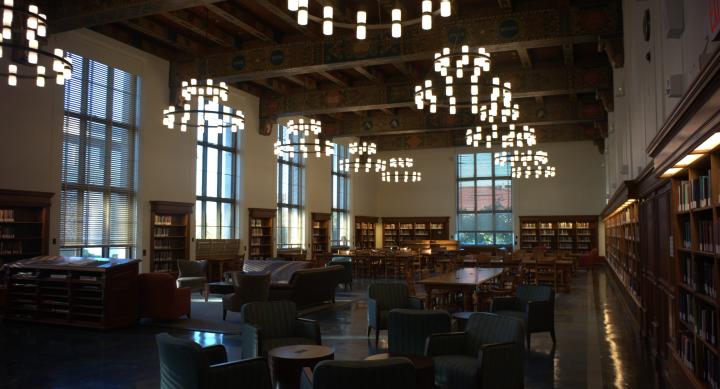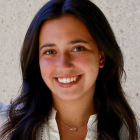
Photo Credit: Poncho Carrillo
When visiting UT’s Moody College of Communication webpage, readers are greeted by the statement: “People are the Heart of Moody.” Below this statement are three claims: exceptional faculty, talented students and incredible alumni. While each is valuable on its own, it is the rare intersection of the three that provides a unique perspective on Moody and the education it offers.
Dr. Natalie Czimskey, Dr. Madeleine Holland and Dr. Marialena Rivera are Moody faculty members who double as UT alumnae, with Dr. Holland and Dr. Czimskey being specifically Moody graduates. Having experienced Texas from both sides of the student-faculty relationship, these professors shared nostalgic recollections, changing opinions and invaluable advice curated from their “double-lives” within Texas, and more so, Moody.
Dr. Natalie Czimskey
A triple Longhorn is someone who has completed all three of his or her degrees at UT Austin. With a Bachelor's in Communication Sciences and Disorders, Master's in Speech Language Pathology and PhD in Neurogenic Disorders of Language, Dr. Czimskey has earned this title.
Here for the National Championship in 2005, Czimskey describes her time at Texas as being wild and energetic — similar to attitudes toward football now. When not chasing the championship t-shirts in one of her many intramural teams, Czimskey could be found by the Turtle Pond or in the Life Sciences Library in the tower to study.
“It's one of those places where it feels like college,” Czimskey said.
Apart from studying, Czimskey made advances toward her career by researching Aphasia, a speech disorder, in a lab and working in a local school as a caregiver for a student with Autism. Soon enough, her career aligned. In 2012, a year after earning her Masters degree, Czimskey began teaching at UT.
“My students were all mostly seniors, and so the distance felt very minimal,” Czimskey said.
This quick turnaround made Czimskey question her place as an educator to students in her own school and colleagues who were once her professors. This feeling multiplied once she completed her PhD and joined the faculty full-time. As she embarked on a new era of her life, remnants of the old one remained. This was until school stopped during the COVID outbreak.
“In the weirdest way, I think that was helpful for me,” Czimskey said.
While accompanied by numerous difficulties, that forced distance was just the thing Czimskey needed to separate the phases of her life and fully embrace her new normal. Furthermore, it played a large role in molding the values she holds as a professor today. COVID made Czimskey hyper-aware of the situations her students were facing outside of school — an effect she finds formative in her teaching. Therefore, she interprets the relationship portion of her interactions with students as the most important part of teaching.
In her classroom, Czimskey focuses on cultivating a relaxed atmosphere that transforms SLHS, a major with a tightly controlled curriculum, to an understandable and enjoyable practice of inquiry. She does this to encourage connection-making in replacement of the memorization spiral to which she sees students frequently succumb.
Therefore, Czimskey shared advice on breaking the somewhat monotonous culture of SLHS education — specifically when talking about graduate school.
“Keep your head down. Get it done. Knock it out,” Czimskey said, referring to the advice she received about graduate school. “Now, I think when I talk about graduate school I say go where you’re healthiest.”
Czimskey is truly an advocate for the humanization of SLHS education, and it shines through in both her classroom culture and wise advice for the next generation of students.
Dr. Madeleine Holland
After completing her Bachelor's degree in Communication at Boston College, Dr. Madeleine Holland became a Longhorn during her graduate and PhD journeys in Communication Studies. As a student, a majority of her time was spent doing work and research. In fact, when she stayed back during spring break to finish some papers, she worked for so long that the motion sensor lights in her office even turned off! However, in the little free time she had, she spent it training her young dog, playing on her department’s intramural kickball team, The Whales, and visiting the old Littlefield patio for a sandwich.
Holland sought to leave academia and research in industry after her PhD until Dr. Vangelisti (now, interim Dean of Moody) and the Dean at the time approached her with a job teaching communication skills in the School of Engineering for two years. Fast forward, and now, Holland is in her seventh year on faculty.
“The community that I get to experience in Moody is really something special — the collegiality, getting to know people, how interdisciplinary we are, how much we work with people across departments. I think it's the best college on campus,” Holland said.
Now, as she views Moody from the faculty perspective, she observes the differences in culture, lifestyle, and spirit in comparison to her graduate experience.
“I see more faculty members who I'm friends with having tailgates, getting people together to watch a game, wearing burnt orange than I necessarily see in the graduate student population,” Holland said.
Furthermore, she now has a heightened understanding of Moody’s student body. In this capacity, she has recognized the benefits and consequences that come with a concept she finds over-abundant in Moody students: creativity. In many cases, it is the creativity of Moody students that she finds sets them apart from others. However, she simultaneously sees students struggle to apply their creative passions to requirements within the classroom setting, so she focuses on remedying those struggles.
“Bring your passion for that into what I'm asking you to do, do the learning there, and then bring it back to what you want to do in your career,” Holland said.
She attributes this tenacity among students as one of the most striking continuities between her time as a student and a faculty member. Holland explains that as a student, this Texas culture inspired her to truly give it her all. Now, as a professor, this mindset has given her a more gracious attitude toward her students because she knows from experience that, despite some outcomes, they are trying their best.
On this note, Holland shared a piece of advice she received as an educator that similarly applies to students.
“If you always give your absolute best, your 100 to every single thing, you will have no energy left at the end of the day, and in fact, you just can't. So what's important to do is figure out the things that are most important to you,” Holland said.
With this prioritization, passion, accomplishment and scholarliness is possible free of burn-out.
Dr. Rivera
Not all of Moody’s “longest” Longhorns, however, are Moody alumni. Dr. Marialena Rivera, a graduate of McCombs School of Business and the College of Liberal Arts, is a prime example of this. With an extensive background in the diverse programs that UT offers, Dr. Rivera provides a unique perspective on both the Texas experience as a whole and the aspects of Moody that set it apart from other colleges on campus.
After beginning in the Business Honors Program, Rivera struggled to find classes that piqued her interest. Therefore, as she discovered a love for government and policy, she quickly found herself immersed in a triple major of business honors, marketing, and government. Despite these rigorous academics, Rivera found time for numerous other experiences.
“So much of the magic of being an undergrad here is outside of the classroom,” Rivera said.
One of these included exploring campus in search of free date ideas with her now husband. From Turtle Pond, to the LBJ fountain, to the UT's biggest trees, Rivera found what she decided were the most beautiful spots on campus.
“I'm grateful for those experiences and those, like, free dates, because it really made me appreciate campus so much,” Rivera said.
In addition to these excursions, Rivera dedicated lots of time to various extracurriculars. For her, this included the Undergraduate Business Council, UT Student Government, Orange Jackets (a women's service organization), and being a Resident Assistant. Across all of these adventures, Rivera found a passion for helping her peers and connecting them to resources. Now, as she teaches COM 301E, the introduction to communications class that every freshman is required to take, she has continued with this passion.
“I just love being able to share all the things that UT has to offer because it really is such a resource-rich institution,” Rivera said.
As a student in this very class, I see her goals in action. At the end of every class, Dr. Rivera makes time to share various happenings around campus and Austin and share words encouraging explorations outside of the classroom. In this sense, she thinks that while students often struggle to decipher which organizations are right for them, finding the right organizations makes students flourish both academically and personally.
Because of this trend, Rivera’s biggest piece of advice for students is focused on involvement.
“Don't let yourself be sitting in your dorm room or your apartment being bored. There's always something to do. There's always something to join,” Rivera said.
